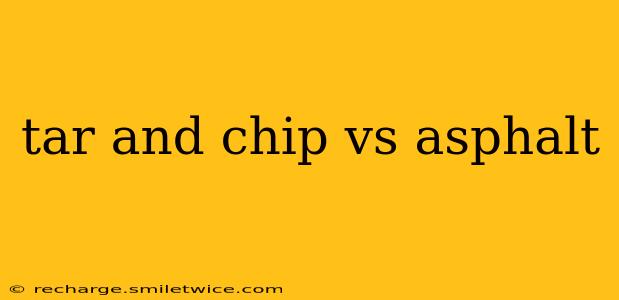Choosing the right paving material for your driveway, road, or parking lot is a crucial decision impacting both aesthetics and longevity. Two popular options often considered are tar and chip and asphalt. While both are used for paving, they differ significantly in their composition, application, lifespan, and overall cost. This comprehensive guide will delve into the key differences between tar and chip and asphalt, helping you make an informed choice for your specific needs.
What is Tar and Chip?
Tar and chip, also known as chip seal, is a cost-effective paving method ideal for low-traffic areas. It involves applying a layer of hot asphalt emulsion (the "tar") followed by a scattering of small, angular stones ("chips"). The stones are embedded in the emulsion, creating a textured, durable surface.
Advantages of Tar and Chip:
- Cost-Effective: Tar and chip is significantly cheaper than asphalt paving, making it an attractive option for budget-conscious projects.
- Quick Installation: The application process is relatively quick and straightforward, minimizing disruption.
- Water Resistant: Once the chips are firmly embedded, the surface provides good water resistance, preventing water damage to the underlying base.
- Good Traction: The textured surface offers excellent traction, especially in wet conditions.
Disadvantages of Tar and Chip:
- Shorter Lifespan: Compared to asphalt, tar and chip has a shorter lifespan, typically requiring more frequent maintenance and resealing.
- Less Smooth Surface: The textured surface is not as smooth as asphalt, which can be less comfortable for driving and walking.
- Loose Chips: Loose chips can be a nuisance, potentially damaging tires or being tracked into buildings.
- Limited Aesthetics: The appearance is relatively rustic and might not suit all aesthetic preferences. It's less visually appealing than smooth asphalt.
What is Asphalt?
Asphalt pavement, also known as asphalt concrete, is a more refined paving material composed of aggregates (like gravel and sand), asphalt binder (bitumen), and fillers. This mixture is heated, mixed, and laid down in layers, creating a smooth, durable surface.
Advantages of Asphalt:
- Smooth Surface: Asphalt provides a smooth, comfortable driving and walking experience.
- Durable and Long-lasting: With proper maintenance, asphalt pavements can last for many years, often outlasting tar and chip significantly.
- Aesthetically Pleasing: Asphalt offers a clean, uniform appearance that enhances the visual appeal of any property.
- Easy to Repair: Potholes and cracks in asphalt are relatively easy to repair, extending the pavement's lifespan.
Disadvantages of Asphalt:
- Higher Cost: Asphalt paving is significantly more expensive than tar and chip.
- Longer Installation Time: The installation process is more complex and time-consuming.
- Susceptible to Cracking: While durable, asphalt can crack over time, especially in areas with extreme temperature fluctuations.
- Requires More Maintenance: Although less frequent than tar and chip, asphalt requires periodic maintenance, such as sealing and crack repair, to maintain its longevity.
Tar and Chip vs. Asphalt: Which is Right for You?
The best choice between tar and chip and asphalt depends on several factors:
- Budget: Tar and chip is the more budget-friendly option.
- Traffic Volume: Asphalt is better suited for high-traffic areas, while tar and chip is ideal for low-traffic applications.
- Aesthetic Preferences: Asphalt offers a smoother, more aesthetically pleasing appearance.
- Lifespan Requirements: Asphalt provides a longer lifespan and requires less frequent maintenance.
How Long Does Tar and Chip Last?
The lifespan of tar and chip varies depending on factors like climate, traffic volume, and maintenance. Generally, you can expect tar and chip to last between 3 and 5 years before needing resealing.
How Long Does Asphalt Last?
Asphalt's lifespan is considerably longer than tar and chip. With proper maintenance, asphalt pavements can last for 15 to 20 years or even longer in some cases.
Is Tar and Chip Good for Driveways?
Tar and chip can be suitable for low-traffic driveways, but its shorter lifespan and less smooth surface might not be ideal for all homeowners.
Is Asphalt Better Than Tar and Chip?
Asphalt generally offers superior durability, longevity, and aesthetics compared to tar and chip, but it comes at a higher cost. The "better" option depends entirely on your specific needs and priorities.
This detailed comparison should help you decide whether tar and chip or asphalt is the best paving solution for your project. Remember to consult with paving professionals to assess your specific needs and receive personalized recommendations.
